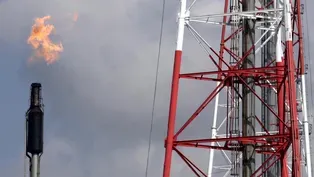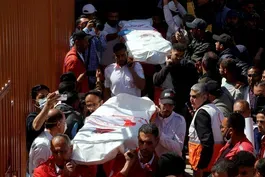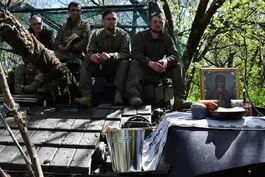
‘Utter desperation’ in Gaza amid Israel’s aid blockade
Clip: 4/20/2025 | 4m 58sVideo has Closed Captions
‘Utter desperation’ in Gaza after ceasefire collapse and Israel’s aid blockade
Since the collapse of the ceasefire between Israel and Hamas in March, Gaza has received no deliveries of food, water, fuel or medical supplies as Israel has blocked all humanitarian aid, leaving Gazans in dire straits. John Yang speaks with Gavin Kelleher of the Norwegian Refugee Council about conditions on the ground there.
Problems with Closed Captions? Closed Captioning Feedback
Problems with Closed Captions? Closed Captioning Feedback
Major corporate funding for the PBS News Hour is provided by BDO, BNSF, Consumer Cellular, American Cruise Lines, and Raymond James. Funding for the PBS NewsHour Weekend is provided by...

‘Utter desperation’ in Gaza amid Israel’s aid blockade
Clip: 4/20/2025 | 4m 58sVideo has Closed Captions
Since the collapse of the ceasefire between Israel and Hamas in March, Gaza has received no deliveries of food, water, fuel or medical supplies as Israel has blocked all humanitarian aid, leaving Gazans in dire straits. John Yang speaks with Gavin Kelleher of the Norwegian Refugee Council about conditions on the ground there.
Problems with Closed Captions? Closed Captioning Feedback
How to Watch PBS News Hour
PBS News Hour is available to stream on pbs.org and the free PBS App, available on iPhone, Apple TV, Android TV, Android smartphones, Amazon Fire TV, Amazon Fire Tablet, Roku, Samsung Smart TV, and Vizio.
Providing Support for PBS.org
Learn Moreabout PBS online sponsorshipJOHN YANG: Since the collapse of the ceasefire between Israel and Hamas in early March, Gaza has not received any deliveries of food, water, fuel or medical supplies as Israel has blocked all humanitarian aid that's left Gazans in dire straits.
Earlier I spoke with Gavin Kelleher of the Norwegian Refugee Council, who's in Gaza.
GAVIN KELLEHER, Norwegian Refugee Council: The situation here on the ground in Gaza is one of utter desperation.
People are already running out of the things that they need to stay alive.
Civilians are being attacked incessant military violence.
People are being displaced in their hundreds of thousands.
More than 420,000 people displaced in the last month alone.
And people are being denied access to the basics they need to survive, including food and dwindling access to water.
JOHN YANG: Is it possible to single out one greatest need?
GAVIN KELLEHER: I would say that access to food at this point has reached a really critical juncture.
Most families in Gaza are now surviving on just one meal a day.
Many of those families are splitting that meal in half just to try to get through the day.
People are exhausting their coping mechanisms now to access food.
People are selling their belongings, they're selling their clothes, trying to access cash to get food.
Others are bartering.
On social media, you see posts for people trying to sell diapers or exchange diapers for a bag of lentils or cooking oil.
Begging is also overwhelming at this point.
But of course, very few people have any ability to assist now because nothing has entered Gaza for almost 50 days.
JOHN YANG: Talk about that.
The renewal of fighting, the new blocking aid getting into Gaza.
50 days.
Had things been getting better before that?
GAVIN KELLEHER: In the period during the ceasefire, were able to scale up our shelter response.
Access to food was improved.
The markets were increasing in capacity.
When the ceasefire collapsed, though, everything changed.
So nothing had come in, there were no supplies coming in.
But needs are growing as more and more people are being displaced in this violence and we're unable to support them now.
Humanitarian organizations on the ground have had our hands tied.
JOHN YANG: How is the situation affecting your group's ability to operate?
GAVIN KELLEHER: We have empty warehouses at this point.
We have a small number of supplies left in the south that we will continue distributing over the next week.
Other than that, we're contracting water trucks so people can still have some access to clean drinking water.
But everything here is on a knife's edge.
At any point now, we could run out of access to fuel, which is needed to continue producing water in Gaza and to continue moving it around.
And the hunger that is growing here now is becoming the number one priority for people on the ground.
And as an organization, we're not able to bring any supplies in.
There's nothing that we can do at this point other than continue to call for the crossing points into Gaza to be opened.
JOHN YANG: Yesterday, Israeli Prime Minister Benjamin Netanyahu said Israel had no choice, in his words, but to continue fighting in Gaza.
He said the war won't end before they destroy Hamas, free the hostages, and make sure that Gaza is no longer a threat to Israel.
What do you say to that?
GAVIN KELLEHER: I think we have to separate out the obligations that Israel has under international humanitarian law at this point.
Every single truck of aid that Israel is denying from entering Gaza is risking becoming a death sentence for people here who have already run out of food on the ground.
And it is unacceptable to employ collective punishment on this scale for 2.1 million people in pursuit of military objectives.
JOHN YANG: The Israelis, of course, say that they are fighting Hamas, they're not fighting Gazans.
Is it possible to separate the effect between the two?
GAVIN KELLEHER: It's not possible to separate the effect between the two at this point.
We continue to see dozens of airstrikes a day.
We continue to see babies, infants, children, women, men being blown apart who are very clearly civilians in these waves of military violence, we're also seeing the collective punishment with denial of any aid response.
So right now we are seeing civilians in Gaza suffer.
And that is undeniable at this point because Israel is pursuing military objectives without enough consideration for the civilians that are here on the ground.
JOHN YANG: You say that things are on a knife's edge.
Is it possible to say that if you don't get aid by a certain point, it's going to be the point of no return?
GAVIN KELLEHER: We expect that in the next week to two weeks, the community kitchens, which are providing maybe one meal a day to around half of the families in Gaza, will fully exhaust their supplies.
But I think you can imagine if you built a wall around an American city of 2.1 million people and stopped letting anything come in at all for 50 days and continue to pursue that policy, of course we are going to see unavoidable deaths here in the tens of thousands if the siege is not lifted in the coming weeks.
JOHN YANG: Gavin Kelleher in Gaza, thank you very much.
GAVIN KELLEHER: Thank you.
Gaia bids farewell after a decade of mapping the stars
Video has Closed Captions
Gaia space observatory bids farewell after a decade of mapping the stars (4m 7s)
How the closure of EPA offices puts poor communities at risk
Video has Closed Captions
How the closure of EPA offices puts poor and minority communities at risk (5m 19s)
News Wrap: Israel finds ‘failures’ in killing of Gaza medics
Video has Closed Captions
News Wrap: Israel finds ‘failures’ that led to killing of Palestinian medics in Gaza (3m 16s)
Ukraine, Russia trade blame for breaking Easter ceasefire
Video has Closed Captions
Ukraine and Russia trade blame for breaking Easter ceasefire as talks to end war drag on (5m 38s)
Providing Support for PBS.org
Learn Moreabout PBS online sponsorshipSupport for PBS provided by:
Major corporate funding for the PBS News Hour is provided by BDO, BNSF, Consumer Cellular, American Cruise Lines, and Raymond James. Funding for the PBS NewsHour Weekend is provided by...















